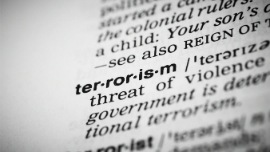The 2005 Warsaw Convention and its Additional Protocol
The Council of Europe Convention on the Prevention of Terrorism (CETS No. 196) aims to support and strengthen the fight against terrorism while reaffirming that all measures taken to prevent or suppress terrorist offences have to respect the rule of law and democratic values, human rights and fundamental freedoms. The Convention opened for signature on 16 May 2005 and entered into force on 1 June 2007.
The Convention is aimed at improving national counter-terrorism policies and strategies at the domestic level while also facilitating effective international co-operation and mutual legal assistance in criminal matters. Defining “terrorism” in line with the main universal counter-instruments, the Convention calls for the establishment of appropriate national terrorism prevention policies and establishes several acts as criminal offences, such as public provocation to commit a terrorist offence (Article 5), recruitment for terrorism (Article 6), and training for terrorism (Article 7). The Convention also requires Parties to adopt measures to protect and support the victims of terrorism through appropriate national schemes.
At the international level, the Convention is designed to enhance existing principles of mutual legal assistance and co-operation in criminal matters, for instance by ensuring that persons alleged to have committed offences covered by the Convention are prosecuted or extradited where there is overlapping jurisdiction.
The Additional Protocol to the Council of Europe Convention on the Prevention of Terrorism (CETS No. 217) was opened for signature on 22 October 2015 and entered into force on 1 July 2017. The Additional Protocol addresses the main substantive criminal law elements of the United Nations Security Council resolution 2178 (2014) aimed at enhancing international co-operation to prevent and prosecute persons travelling for the purposes of terrorism. Supplementing the criminal law provisions of the Convention, the Additional Protocol adds the following new offences: participating in an association or group for the purposes of terrorism (Article 2), receiving training for terrorism (Article 3), travelling abroad for the purpose of terrorism (Article 4), funding travelling abroad for the purpose of terrorism (Article 5), and organising or otherwise facilitating travelling abroad for the purpose of terrorism (Article 6).
CDCT instruments
- Recommendation CM/Rec(2017)6 of the Committee of Ministers to member States on “special investigation techniques” in relation to serious crimes including acts of terrorism
- Recommendation CM/Rec(2018)6 of the Committee of Ministers to member States on Terrorist Acting Alone (when approved).
CDDH instruments related to terrorism
- Guidelines on human rights and the fight against terrorism adopted by the Committee of Ministers on 11 July 2002;
- Revised guidelines on the protection of victims of terrorist acts adopted by the Committee of Ministers on 19 May 2017.
CDPC instruments related to terrorism
- Recommendation Rec(2005)9 on the protection of witnesses and collaborators of justice;
- Guidelines for prison and probation services regarding radicalisation and violent extremism (Adopted by the Committee of Ministers on 2 March 2016, at the 1249th meeting of the Ministers' Deputies).




